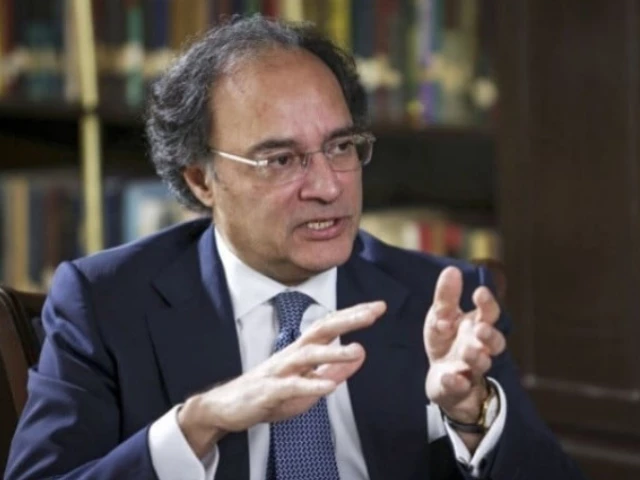KARACHI:
Finance Minister Muhammad Aurangzeb emphasised that Pakistan must align competitiveness with sustainability and innovation with inclusion to secure its economic future, as he addressed the opening day of the 9th edition of The Future Summit (TFS) – a well-known thought leadership platform.
Speaking at the event, co-hosted by Nutshell Group and the National Bank of Pakistan (NBP) in strategic partnership with Faysal Bank Limited and the Overseas Investors Chamber of Commerce & Industry (OICCI), the finance minister underscored the government’s commitment to “course correction” through coordinated structural reforms, digital transformation, and institutional efficiency.
“Structural reforms are being operationalised in a coordinated manner across all sectors of government,” Aurangzeb said. “AI-led transformation in the taxation system, rightsizing of ministries, and process digitisation at the Federal Board of Revenue (FBR) are enabling transparency and efficiency. Macroeconomic stability is not an end in itself – it is a means to create an environment for investment and sustainable growth.”
He further noted that the government is working to provide digital infrastructure for AI-led growth. “Google is partnering with us to make Pakistan a regional IT and technical hub,” he said, adding that a private investor has committed $13 million to establish a blockchain centre at Lahore University of Management Sciences (LUMS).
The minister also pointed out that population management and climate change remain existential challenges: “We must correct our direction when faced with such threats – our growth must be sustainable, inclusive, and future-ready.”
The finance minister’s remarks reflect a broader shift in Pakistan’s economic narrative – from short-term stabilisation towards long-term competitiveness.
Policymakers are increasingly focused on integrating technology, institutional reform, and private-sector collaboration to unlock sustainable growth. Analysts note that aligning fiscal discipline with innovation and inclusion will be crucial for Pakistan’s resilience amid global economic headwinds, climate pressures, and demographic challenges. The call for “course correction” underscores the need to move beyond reactive policymaking and establish a clear, consistent roadmap for investment, industrial modernisation, and digital transformation.
Federal Minister for Climate Change & Environmental Coordination, Senator Dr Musadik Malik, echoed this call for structural transformation, emphasising fairness and equal opportunity. “The death of hope is the worst thing, and hope can only thrive in a competitive environment,” he said. “Education, values, and equality of opportunity are the real drivers of progress.” He urged policymakers to dismantle elite structures that stifle innovation and productivity, saying, “Only a level playing field can foster the competition and fairness needed for a resilient economy.”
Sindh Chief Minister Syed Murad Ali Shah, who attended as chief guest, commended the summit for bringing together diverse thought leaders to chart Pakistan’s path forward. “The future belongs to those who adapt fastest,” he said. “We must redefine our direction towards innovation and sustainable growth.”
The chief minister emphasised Sindh’s focus on modernisation and digital infrastructure, calling for federal collaboration in developing technology parks that can accelerate research and entrepreneurship.
Khyber-Pakhtunkhwa Governor Faisal Karim Kundi, attending as guest of honour, highlighted the importance of investor confidence and public-private collaboration. “Redefining direction is not a choice, it is a necessity,” he said. “We are ready to welcome local and foreign investors to Khyber-Pakhtunkhwa with a long-term vision based on trust, partnership, and growth.”
Rehmat Ali Hasnie, NBP President and Chief Executive, said the banking sector is undergoing its own course correction through digital transformation. “Driving a cashless economy and financial inclusion are key national priorities,” he said. “We need to reposition Pakistan’s economy from traditional manufacturing to a knowledge-driven, export-led framework.” He added that NBP is expanding digital access to underserved communities and strengthening wholesale banking within the microfinance sector.
Yousaf Hussain, President of OICCI and Faysal Bank Limited, highlighted the need for coordinated policy action and competitiveness-focused reforms. “Fiscal transformation and data digitisation are at the heart of sustainable progress,” he said. “A high-level council under the prime minister is ensuring policy alignment.” He further noted that “Pakistan’s narrative must shift to national competitiveness,” adding that access to fast-growing markets in China and the GCC provides a strategic advantage, and Pakistan’s youth can be the engine of growth through technology and skills.
Lasha Tabidze, Global Chief Digital Operations Officer at VEON, reaffirmed Pakistan’s growing role in global digital transformation. “True digital inclusion means not leaving anyone behind,” he said. “At VEON, we define AI as automated intelligence – and Pakistan remains a vital hub where innovation flows from local ecosystems to the world.” Delivering the welcome address, Rabia Ahmad, Director and Chief Executive of Nutshell Group, framed the summit’s theme around leadership and renewal. “Course correction is the highest form of leadership,” she said. “The Future Summit has always been a platform for reflection and transformation. As we stand at a crossroads of change, our duty is not just to debate the future – but to define it, boldly and responsibly.”
On the first day of TFS 2025, policymakers, business leaders, and investors discussed Pakistan’s evolving economic direction. The dialogue reinforced a central message: Pakistan’s transformation depends on consistency, collaboration, and a long-term commitment to reform.

